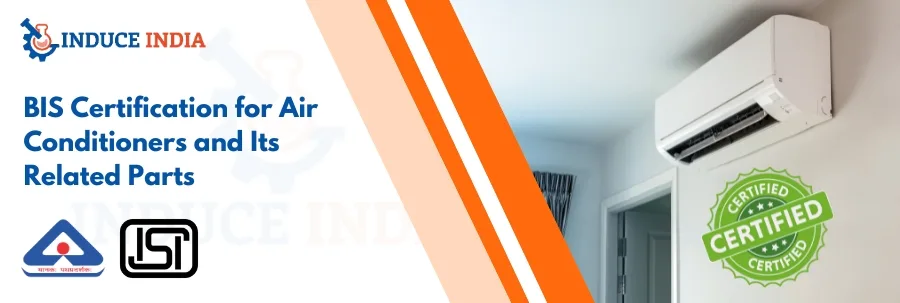The Indian air conditioner market is expected to grow at 6.08% annually until 2027F as it reaches a value of USD6,054.96 million. The main drivers behind the growth of the Indian air conditioner market include both e-commerce sales expansion alongside economic development and increasing per capita earnings as well as rising industrial sector requirements. The changing climate of the nation leads to permanent temperature increases which drives up air conditioner demand.
The AC market shares among all segments are controlled by residential air conditioners because of the growing strength of household expansions and new residential communities being built. The growth of construction activities creates rising market demand for air conditioning systems that residential buildings now require BIS Certification for. Air conditioners alongside their related parts compliance to display their standard mark through a licensing system issued by the Bureau of Indian Standards.
For an air conditioner or its associated elements including heat exchangers hermetic compressors temperature sensing control devices and room air conditioners to meet Indian standards for customer safety, they must receive BIS certification. The quality standards defined by applicable Indian requirements are fully met by BIS-certified and ISI-marked products.
The first step requires understanding both BIS and BIS licenses.
The Indian standard organization Bureau of Indian Standards (BIS) directs the management development and grading process for consumer products. Quality certification from BIS marks essential goods for end users to guarantee their permanent reliability along with stability and quality features. The public receives high-quality risk-free products through the programs of BIS certification.
Through its scheme named ISI Mark BIS grants manufacturers a BIS license to use on their products. Goods receiving BIS licenses at the bureau can display the ISI mark when meeting relevant Indian standards.
The Order for Quality Control of Air Conditioner and its related Parts Sheathes the Hermetic Compressor as well as Temperature Sensing Controls.
The Ministry of Commerce and Industry established the Air Conditioner and its Related Parts, Hermetic Compressor, and Temperature Sensing Controls (Quality Control) Order, 2019 to regulate standard compliance while enforcing standard mark mandates.
Under this QCO the Air Conditioner with its linked Parts alongside the Hermetic Compressor and Temperature Sensing Controls requires meeting particular Indian standards by bearing the Indian Standard Mark (ISI Mark) that obtains its license through the Bureau of Indian Standards as per Scheme I from Schedule-II of Bureau of Indian Standard (Conformity Assessment) Regulations, 2018.
This Quality Control Order requires all listed products to have Indian standards compliance with the stated requirements for carrying an ISI mark.
| Indian Standards | Goods Of Article |
| IS 1391 (Part 1): 2017 | Room air conditioners – unitary air conditioners. |
| IS 1391(Part 2): 2018 | The specifications of unitary and split air conditioners are detailed in IS 1391 (Part 1) 2017 and IS 1391 (Part 2) 2018. |
| IS 8148: 2018 | Ducted and packaged air conditioners. |
| IS 11329: 2018 | Finned type heat exchanger stands as a requirement for room air conditioners under this quality control order. |
| IS 10617: 2018 | Hermetic compressor. |
| IS/IEC 60730 (Part 2) Section 9: 2011 | Temperature sensing control devices |
According to this standard companies must establish performance requirements and design specifications for air conditioners together with their components and the integrated system with hermetic compressors and temperature sensing controls. Three performance characteristics can be determined through tests conducted under established test conditions according to this standard.
- Manufacturers seeking to market AC in the Indian market need BIS certification before using the standard mark. BIS gives an AC Hermetic compressor and its components-related parts certificate once testing establishes their full compliance with Indian standards requirements.
- All manufacturers must verify that their Air Conditioner (AC) Temperature sensing control device and their associated parts fulfil all necessary Indian standards to claim a BIS Licence.
- BIS licensing enables businesses to increase their consumer trust while using the process to confirm both product safety and the elimination of physical risks to health.
The previous section discussed BIS together with its advantages of having a BIS Licence. The process for BIS certification of your product remains a puzzling question. This piece details the procedures needed for BIS certification of air conditioners combined with their parts as well as hermetic compressors and temperature sensing controls.
Procedures needed for BIS certification of air conditioners:
The BIS certification procedure includes steps for air conditioner units together with their accessories along with hermetic compressors and temperature regulation components.
- BIS certification for AC and its related parts requires completion of the following process:
- The requirement for BIS certification of your protective textile product demands complete document preparation before an application submission.
- The BIS Portal receives the application form together with all prepared supporting documentation.
- After scrutiny completion, the BIS will select an auditor to examine the manufacturing area. The factory inspection includes BIS officials collecting product examples which they will send to testing facilities approved by BIS.
- The BIS-approved laboratory will test all collected samples to confirm conformity with approved Indian standards.
- A BIS License will be issued to manufacturers when their products enforce all necessary Indian standards. Grant approval from BIS begins at a minimum of one year yet lasts for a maximum period of two years. License renewal applications along with their corresponding payment must reach BIS within ninety days from license expiration.
The procedure for obtaining a BIS license to sell AC products in India requires several required documents.
List of Documents Required for BIS Certification of ACs in India
Acquisition of the BIS ISI Mark for air conditioners demands particular documents and generic documents comprising these specifications.
- Laboratory Test Reports as per Product Standard
- Factory Registration Documents
- Manufacturing process flow chart
- In-house Testing Facilities
- Details of Authorised Signatory and other related documents
The total expense for BIS certification which covers the licensing process of AC products needs to be determined.
BIS Certification Fees for Air Conditioners in India:
The BIS license costs for air conditioners consist of application fees combined with audit costs sample testing expenses and licensing expenses in addition to marking fees.
- Application fee
- Audit fee
- Sample testing fee
- License fee
- Marking fee
Factory facilities needed significant investments due to the requirement of testing equipment for their newly established in-house test laboratories.
Conclusion:
To display the standard ISI mark on their products Air conditioners require a BIS license that is mandatory. A BIS license will be issued by the Bureau to manufacturers who create products that match Indian standards. A BIS license is required by all manufacturers for both Air conditioner products and their components to display the ISI standard mark. However, compliance can be tricky. Getting BIS certification presents greater difficulty than anticipated because it requires working with authorities and performing tests on samples while following BIS standards. Professional assistance provides the best route to achieve successful BIS ISI Mark certification because experts manage the complete process.
The organization Induce India serves as your sole provider for compliance needs and solutions. Manufacturers and importers benefit from Induce India which serves as a unified gateway to receive product evaluation together with educational programs technical validation services and accreditation services as well as laboratory installation and regulatory compliance testing. The Expert will support your product testing with expert guidance throughout the entire process which covers standard testing compliance along with thorough documentation needed for BIS certification.



